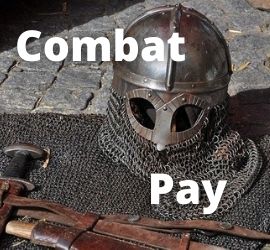What Is a QTIP Trust – Qualified Terminable Interest Property Trust?
 A QTIP Trust is a qualified terminable interest property trust. It enables the grantor (or creator) to provide for a surviving spouse. Additionally, it allows for control of how the trust’s assets are distributed once the surviving spouse dies. Income, and sometimes principal, generated from the trust is given to the surviving spouse to ensure that the spouse is taken care of for the rest of their life. i
A QTIP Trust is a qualified terminable interest property trust. It enables the grantor (or creator) to provide for a surviving spouse. Additionally, it allows for control of how the trust’s assets are distributed once the surviving spouse dies. Income, and sometimes principal, generated from the trust is given to the surviving spouse to ensure that the spouse is taken care of for the rest of their life. i
In a marital gift trust, the estate is split in two. One section is put in a trust fund and the second given directly to the surviving spouse. Just like with a QTIP, there is no estate tax charged against either share. But, unlike with a QTIP, the surviving spouse can typically appoint beneficiaries of the trust following their death.
A qualified terminable interest property (QTIP) trust allows an individual, called the grantor, to leave assets for a surviving spouse. However, it also allows him to determine how the trust’s assets are split up after the surviving spouse dies. Under a QTIP, income is paid to a surviving spouse. The balance of the funds is held in trust until that spouse’s death. At that point, it is then paid out to the beneficiaries specified by the grantor. QTIP trusts are used in estate planning. They are useful when beneficiaries exist from a previous marriage but the grantor dies before a subsequent spouse does. With a QTIP, the estate tax is not assessed at the point of the first spouse’s death. Instead, it is determined after the second spouse has passed.
How a QTIP Trust Works
A QTIP Trust is an irrevocable trust. It is commonly used by individuals who have children from another marriage. QTIPs enable the grantor to look after his current spouse. However, he can then make sure that the assets from the trust are then passed on to beneficiaries of his choice. Often, the children from the grantor’s first marriage. A QTIP trust can provide the living spouse with a source of funds on which to live. However, it can also help limit applicable death and gift taxes. Additionally, it can assert control over how the funds are handled should the surviving spouse die. This is because the surviving spouse never assumes the power of appointment over the principal. This can prevent these assets from transferring to the living spouse’s new spouse, should she remarry.
The property within the QTIP that provides funds to a surviving spouse qualifies for marital deductions. This means the value of the trust is not taxable after the first spouse’s death. Instead, the property becomes taxable after the second spouse’s death. Tax liability then transfers to the named beneficiaries of the assets within the trust.
QTIP Trust vs Marital Trust
QTIP trusts are similar to marital trusts. You might even say a QTIP trust is like a specific type of marital trust. You should consult with an estate planning attorney for more detail. These trusts can be tailored to your needs and the nuances are very important.
- A marital trust – is simply a trust that is created upon the death of the first spouse for the surviving spouse’s use. It is one part of a bypass trust, also known as an AB trust. Unlike with a QTIP trust, the surviving spouse typically has complete control over a marital trust. This includes the use of the trust assets and final say on designating who the final beneficiaries are.
- A QTIP trust – offers more control to the grantor but less control to the surviving spouse compared to marital trust. The surviving spouse cannot choose final beneficiaries and has limited control over the assets, receiving only trust income in accordance with the IRS laws. The marital trust is more flexible and can be modified or set up by the grantor to best fit the circumstances. (Source: policygenius.com)
QTIP Trust and Trustee Appointments
A minimum of one trustee must be appointed to manage the trust. However, multiple individuals or organizations may be named simultaneously. The trustee or trustees will be responsible for controlling the trust. They will also have authority over how the assets are managed. Examples of possible trustees include, but are not limited to, the surviving spouse, a financial institution, an attorney, and other family members or friends.
QTIP Trust and Spousal Payments
The surviving spouse named within a QTIP receives payments from the trust. Payments are based on the income the trust generates. These payments are similar to the issuance of stock dividends. The surviving spouse is never the true owner of the property. As a result, a lien cannot be put against the property within the trust or the trust itself. Payments are made to the spouse for the rest of his or her life. Upon death, the payments cease, as they are not transferable to another person. At that point, the assets in the trust then become the property of the listed beneficiaries.
A QTIP trust can hold many different types of assets. However, it’s important that the trust contains some income-producing property, like a rental property or investment accounts. The primary purpose is to provide a steady stream of income for a surviving spouse. Therefore, the QTIP won’t really work if it holds assets that don’t generate income. When setting up the trust, the grantor can specify that any non-income-producing assets be sold or converted into such.
Why Choose a QTIP Trust?
QTIP trusts are more complicated to set up and require a bit of maintenance. In practice, they aren’t ideal for everyone. For most of its benefits, there may be a simpler type of irrevocable trust that fits your needs. A marital trust or bypass trust may be sufficient. It depends on how much wealth you and your spouse have and how separate you want to keep it. This tends to dictate the extent to which you need this specific type of trust.
Defer estate tax
The QTIP trust can help minimize estate taxes since they are deferred until the death of the surviving spouse. Keep in mind that the surviving spouse’s estate may owe taxes. In 2021, only estates over $11.7 million will be taxed. Most people don’t have estates valued this high. If you want to avoid or minimize estate taxes more fully, you can open a credit shelter trust in conjunction with the QTIP trust.
Protection from a second spouse
A QTIP trust can be a useful part of an estate plan for a blended family. For example, if you are remarried, you can open a QTIP trust that distributes income to your spouse. But, it lets you ultimately give the trust assets to your daughter from a previous marriage, the final beneficiary. This allows you to plan for both people. Another example, you can set up a QTIP trust and name the beneficiary as your son while your surviving spouse receives the income. If your surviving spouse remarries and has a child with a new partner, they cannot redirect the QTIP trust assets to their new child.
Protection from creditors
All irrevocable trusts offer some degree of asset protection from creditors. They restrict a surviving spouse to only receiving income. As a result, there is less risk of losing the assets in the case of lawsuits or debt collectors. The assets are also not countable toward Medicaid resource limits. So, this trust can help the surviving spouse qualify for long-term care if their income falls under the eligibility requirements.
Protection from poor financial decisions
Similar to the above, QTIPs offer protection from financial predators. When the surviving spouse receives a limited stream of income, there is less money that is susceptible to scams. It also limits the beneficiary from their own unwise spending habits.
Guardianship planning
Individuals who become incapacitated should plan ahead by electing powers of attorney. Otherwise, they may have a guardian appointed for them by the court. The guardian will have legal authority over the ward’s finances, including money and assets in a revocable living trust. But, they won’t be able to touch assets in an irrevocable trust such as a QTIP trust. (Source: ibid)
How a QTIP Trust Works to Control Property
Each spouse can set up a QTIP trust, leaving assets to the other in trust. When the first spouse dies, the survivor gets what’s called a “life estate” in the assets that are left to the QTIP trust. The survivor is entitled to any income the assets produce, and in the case of real estate, to its use. Only the surviving spouse can be named as the life beneficiary. The survivor does not, however, have full ownership of the trust assets. The survivor cannot sell them or give them away. When the second spouse dies, trust assets go to the “final beneficiary” named in the trust. Commonly, the final beneficiaries are children from the other spouse’s previous marriage.
Example
Bob sets up a QTIP trust, naming his wife Alice as the life beneficiary. He names his sons from a previous marriage as the final beneficiaries. Bob dies first, leaving Alice a life estate in the assets that are left to the QTIP trust. Assets include their house and some investment accounts. She is paid the income the accounts produce and has the right to live in the house. However, she can’t sell the trust assets, give them away, or leave them at her death. At her death, the assets will pass to Bob’s sons. (Source: nolo.com)
How a QTIP Trust Works to Defer Estate Tax
A QTIP trust doesn’t eliminate the estate tax. Rather, it postpones it until the death of the second spouse. If you create a QTIP trust, then at your death no estate tax is due on the assets that go into the trust. The assets qualify for the unlimited marital deduction. This lets all property, regardless of value, pass to a surviving spouse free of the estate tax.
You can get the estate tax benefits of a QTIP trust only if your spouse is a U.S. citizen. The marital deduction (the rule that lets surviving spouses inherit any amount from the deceased spouse free of estate tax) is key to the QTIP, and it doesn’t apply to non-citizens. You may want to consider another kind of trust, the QDOT or Qualified Domestic Trust, which may help you accomplish your tax-related goals. (Source: ibid)
Day trading can be summarized simply as buying security. Then, quickly selling or closing out the position within a single trading day. Ideally, a day trader wants to “cash-out” by the end of each day with no open positions to avoid the risk of losses by holding security overnight. Day trading is not for everyone and carries significant risks. It requires an in-depth understanding of how the markets work and various strategies for profiting in the short term. Short-term profits require a very different approach compared to traditional long-term, buy and hold investment strategies.




